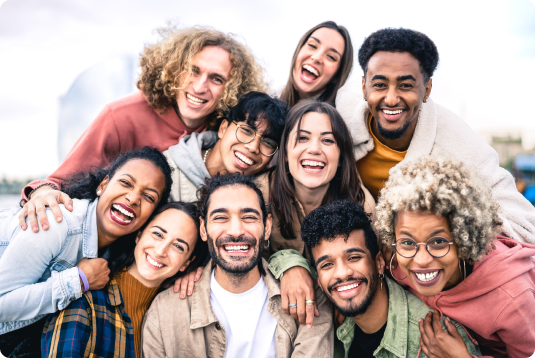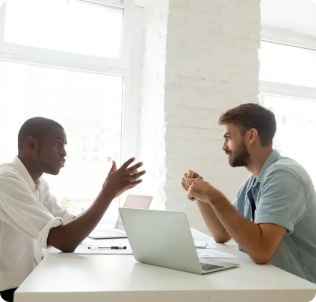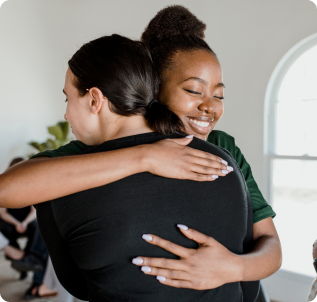Our Mission and Vision
“In the tapestry of humanity, unity between races and religions creates a masterpiece of strength, resilience, and boundless harmony.”

What We Envision
Our heartfelt vision is a world where people rise above their fears, dismantle prejudices, and bridge the gaps of distrust. We firmly believe in the need for genuine acknowledgment of the pain we’ve inflicted upon each other throughout history, and in the healing and transformative power of making amends and reconciliation.
We envision societies:
- 1. Where everyone feels respected, valued and accepted, regardless of their background, beliefs or skin colour.
- 2. Where safe and honest conversations about our history and heritage are the norm, not the exception.
- 3. Where diversity is celebrated as a strength and where everyone feels safe and accepted.
- 4. Where communities of young people are equipped with the tools and knowledge to build a more compassionate future with a sense of interdependence and belonging for all.
What is our mission?
To turn our vision in to reality, our mission lies in:
Organizing community dialogues

We create safe spaces where people can share their stories, perspectives, and experiences.
Emphasizing the need for reconciliation

Empowering and engaging the youth

We empower young people to become leaders in the movement for peace and reconciliation.
Our Story – How did it all begin?
Mrs. Donna Martijn (born in Guyana S.A., grew up in London and presently living in the Netherlands) felt that too many conflicts exist in societies among peoples and among nations due to historical mistakes, crimes and injustice that have not been addressed in a way that the once opposing peoples could join hands and work together to build a prosperous future as one.
In the Netherlands, the history and results of slave trade, enslavement and colonization were not properly being taught in schools nor addressed in the government. Also in other European countries such as Great Brittain, France, Germany, Belgium and so on that have colonized different countries around the world, very little has been (is being) done to heal the still existing wounds and take away the lingering resentment that cause distrust and division in their societies.
In 2019 and 2020 Donna gathered a group of people living in Europe that also felt that something had to be done and since then they have been supporting her call for action with their ideas and suggestions. We started off as ‘Concerned People’ but in June 2023 we officially got registered as a non-profit foundation based in the Netherlands with a new name: Peace and Reconciliation Together (PnR-T)
Initially we wanted to have a weekend where people of different ethnicities could meet, share knowledge of the historical injustices that mankind have done to each other and then have safe conversations whereby every person would express their feelings and represent their ancestors whether in the role of the wrong-doer or the victim. Next we wanted to conduct reconciliation ceremonies through which people could express genuine apologies and or forgiveness, emphasizing feelings of mutual respect, equality and acceptance.
Joint activities would have followed in the form of service activities, sharing cultural expressions and games to form a first bonding experience between people whose ancestors were enemies in the past.
Instead, due to Covid 19 and not being allowed to meet in person, we resorted to meeting on internet via ZOOM, connecting people from different continents and countries.
We could cover many topics:
1. Starting with understanding how African peoples sold their prisoners of war to the European slave traders.
2. Addressing the ‘why’ and ‘how’ the Europeans started the Trans-Atlantic slave trade.
3. We followed the routes of the ‘triangle trade’ looking at what the human beings had to endure being treated as commodity and non-humans.
4. Life after the abolition of slave trade and slavery was also a topic bringing into consideration the effects of colonization and neo-colonization on the African peoples and countries and the African Diaspora.
5. We also looked into tools that helped us to conduct dialogues between people of European descent and people of African descent with empathy and respect for each other’s background.
6. We looked into the psychological dynamics in our lives, from birth on, to understand who we are and how to develop our character. We’ve looked into the need to be aware of the level of sensitivity of the people around us, their background and culture so as not to unwillingly hurt or offend them with our words, actions or jokes resulting in distancing and alienation.
7. We have recorded interviews with married couples of interracial backgrounds to illustrate the struggles people have to deal with when persevering in love to overcome centuries of ancestral enmity, segregation, cultural differences and prejudice. Their victory is the two family lines reconciling and converging into one.
8. More recently we started looking into conflicts such as Apartheid in South Africa and the war situation in Russia, Ukraine and between Israel and Palestine (Hamas).
In Holland we are reaching out to build a local network of peace-making individuals and organizations.


